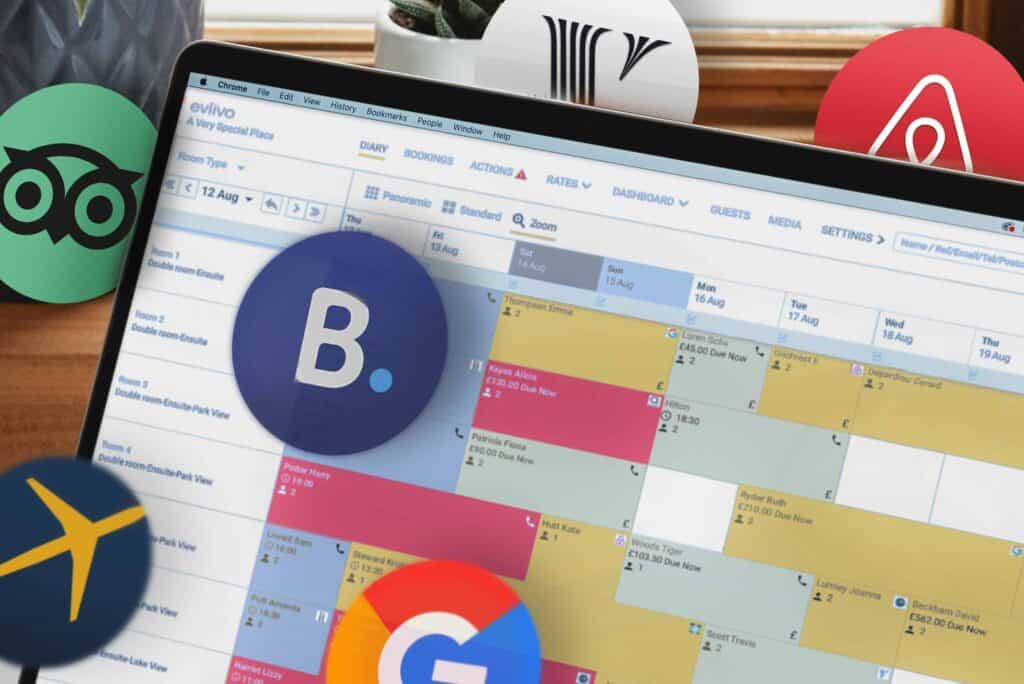Airbnb and Vrbo are the best known vacation rental booking sites out there, with Booking.com and TripAdvisor Rentals now also offering powerful alternatives.
This article focuses specifically on the differences between Airbnb and Vrbo, compares the specific policies of Airbnb vs Vrbo for owners in terms of the audiences they reach and their key policies, and discusses why it might be worth listing your property on either or both rental sites!
Vrbo (formerly HomeAway) has been operating since 1995, gaining prestige in the professional hospitality space.
Airbnb’s launched in 2008 and its disruptive popularity quickly sky-rocketed by opening the market to anyone with a secondary residence or a spare room, propelling the company into the giant that it is today.
Vrbo and Airbnb Travelers: Any Difference?

Vrbo Travelers
Vrbo only accepts whole, private properties, and therefore, the sale of individual single rooms in shared properties are not permitted on their website. As you always rent the whole house, the average price of rentals available on Vrbo is typically higher than that of Airbnb.
If you typically market a ‘whole, self-contained’ accommodation unit, you are less likely to be competing with shared accommodation options in your area, and will only be seen alongside similar properties to yours.
As a result, Vrbo is very attractive to guests who plan family holidays or to older more affluent audiences!
87% of Vrbo’s market are families, making it a smart choice for owners and property managers that prefer to place their trust in families and more mature affluent audiences, rather than younger groups of friends.
Vrbo and its many affiliated brands (Homeaway, Abritel.fr, FeWo-direkt.de, Bookabach.co.nz and Stayx.com.au) have become household names across the globe. And since they are part of the Expedia Group, and they have massive advertising power and brand awareness, making for plenty of great exposure worldwide.
For Vrbo, the main philosophy is to provide privacy to their guests, the freedom of a home away from home.
Airbnb Travelers
Airbnb also boasts a wide reach all around the globe, with its household name and popularity making it easy to captivate guests from pretty much anywhere.
They tend to attract a younger demographic (60% of Airbnb guests are millennials) who favour more central, city-based locations, closer to dining or shopping areas and an attractive nightlife. However, in the last few years, especially with the onset of the pandemic, Airbnb have rural, seaside and out-of-town accommodation.
Airbnb allow you to advertise the rental of individual rooms in a shared property, which makes it easier to reach budget travellers who are more budget-conscious. Airbnb is an easy platform to navigate for hosts who run a single vacation rental and do so casually, or only during specific periods.
This said, Airbnb have also developed many tools and services aimed specifically at the professional rental market and the listing of exclusive accommodation as whole houses, or high-standing apartments. These type of rentals are of particular appeal to young high-flying professionals and their families – typically at a higher price point.
If this sounds like your accommodation, you will definitely thrive on Airbnb!
If you want to easily check specific statistics for your city or town on who uses what travel website you can also check out AirDNA statistics.
You can reach virtually any type of guest on Airbnb and list any kind of property. In fact, business travellers and young professionals are increasingly opting for the local experience that Airbnb provides, as shown on Airbnbcitizen.com (for example, 45,000 companies in the UK have booked Airbnb accommodation for their employees).
Bringing together a community of people who enjoy sharing experiences and travelling like a local, rather than a tourist, is one of Airbnb’s core values. Many hosts provide their guests with invaluable insights on the area’s hidden gems, places to explore, things to do or see, and they will inject a lot of authenticity in the advice their provide. Not something easily found in your typical tourist hotspot brochures.
Policies: Airbnb vs Vrbo For Owners

Let’s jump into the nitty-gritty of each platform’s policies. When listing your properties with online travel agencies, one of the main drawbacks for hosts is having to give away some degree of control over how you wish to run your business and the type of guests you seek to attract.
Finding a travel agency that brings in the bookings and at the same time is willing to align their policies with your preferences is not easy.
It is up to you to manage the right balance between control and booking volumes. To do this, you must be fully aware of the main policy differences between the two platforms, so that you feel confident you’re making the right decisions for your business when listing with them.
Or, you can have your cake and eat it too, by using an integrated property and channel management system (PMS + Channel Manager) like eviivo suite, specifically designed to give you back control while maximising your online reach via these big travel sites.
This way, you retain control by communicating directly with your guests and applying your preferred policies within those supported by each OTA. The advantage of such systems is that you can do it all from one single place, and one single command.
Payment Rules

Vrbo Payments
You can pretty much set up your own deposit policy with Vrbo (within their guidelines). Whether you wish to take 100% payment upfront at the time of booking, or only a deposit. with the remaining balance being paid later, over multiple instances, or on arrival – the choice is yours!
If cash flow matters and if it is something you need manage tightly, Vrbo provides maximum flexibility and this is a big advantage. Combine it with a payment software solution like eviivo suite, and you get maximum direct control and maximum flexibility at the same time.
Airbnb Payments
Airbnb asks that guests pay in advance and all monies are always collected upfront by Airbnb. Airbnb will then pay you later, usually one or two days after your guest checks in.
This option is great in so far as that it takes care of the admin hassles, and keeps cancellation rates down. But in this business, guests often change their minds, and when there is an issue (no-shows, late cancellations, or the need to modify a booking or rebook), you need to do this via Airbnb. In itself this is easy enough, but if you work with multiple travel agencies this can quickly become a drain – unless you use a strong channel manager.
Damage or Security Deposits
Damage or Security deposits are used to protect your property against vandalism of damage. It means that you collect some monies from your guests before or at the start of their stay. If they leave your place in good order, the deposit is refunded at the end of their stay. Otherwise, you keep it in order to fund any repair work.
With the right software, you can automatically pre-authorise the guest card by an amount equal to the damage deposit and only charge it when necessary. Alternatively, you can automate the collection of the deposit a few days before arrival rather than at the time of booking, to avoid unnecessary refunds in the event of a cancellation.

Vrbo Damage Deposit
With Vrbo, you handle any damage deposit directly with the guest. You get to decide the amount and when it needs to be collected – or just preauthorized – and whether or not it is refunded at the end of a stay.
Any claims are also managed between you and the guest directly.
Airbnb Damage Deposit
Any damage deposit you set on Airbnb is always collected and managed by Airbnb themselves.
Airbnb will either retain the guest’s card details on file, or collect the damage deposit and retain the money. You then have 14 days after the guest checks out to make your claim to Airbnb, who will also verify the guest’s story.
Cancellation policy

Vrbo Cancellation Policy
If you are connected to Vrbo via a channel manager like eviivo suite, you have all the flexibility in the world when setting your cancellation policy – whether your policy is non-refundable, fully-refundable, a single flat amount or a single % of the booking value, or different percentages due at different points in time, you can do it!
If you are working manually via the Vrbo platform, Vrbo will give you 5 different cancellation policies to choose from:
- No refund
- Strict: Full refund if the guest cancels up to 60 days before the start of the stay.
- Firm: Same as ‘Strict’ for full refunds, but if the guest cancels up to 30 days before the start of the stay, they receive a 50% refund.
- Moderate: Full refund if the guest cancels up to 30 days before the start of the stay, and 50% refund if they cancel up to 14 days before the start of the stay.
- Relaxed: Full refund up to 14 days before the start of the stay, and 50% refund up to 7 days before the stay.
Note that Vrbo’s ‘Relaxed’ option still requires at least 50% of the booking value to be paid if the booking is cancelled 7 days before arrival. This means that it is not quite as flexible as travel sites who allow a fully refundable cancellation policy.
Airbnb Cancellation Policy
Airbnb allow you to choose from a set of 3 possible cancellation policies:
- Strict: guests are entitled to a full refund only if they cancel within 48 hours after booking and 14 days before check-in. They are entitled to a 50% refund if they cancel between 7-14 days before check-in.
- Moderate: full refund for a cancellation up to 5 days before check-in, and after that they are entitled to a 50% refund for the stay minus the first night, which they pay in full.
- Flexible: the guest is entitled to a full refund if they cancel up to 24 hours before check-in, and if they cancel less than 24 hours before check-in, they pay for the first night but receive a refund for the rest of the stay.
Note that Airbnb’s ‘Flexible’ option allows guests to cancel free of charge as late as one day before arrival.
In Summary, if you work manually with Vrbo or Airbnb you will be restricted in terms of the policies you implement. But if you use a Channel Manager like eviivo, you can achieve maximum flexibility on Vrbo, and across different booking sites.
Airbnb vs Vrbo for your property rental business
Unless you find that either Airbnb or VRBO severely compromises the way you wish to run your business, the smartest strategy is always to cast a wider net by listing your property on both sites.
In fact, the more travel sites you list on, the more you double, triple, quadruple your reach… and the broader your reach, the higher your chances of filling your property all year long!
So, why stop there? While Airbnb and VRBO are the uncontested experts in Vacation Rentals, you should not underestimate the power and reach of other platforms such as Booking.com, TripAdvisor Rentals and Google for Vacation Rentals.
All these platforms advertise your property on their site all year long, but only charge you a commission when they actually deliver a booking. So, there is nothing to lose!
Except … a little more complexity!
Managing multiple listings on multiple platforms can become quite a drain if you attempt to do this manually. You’ll need to patiently update all sites whenever you receive a booking! If one agency sends you a booking, you need to tell all the other agencies that the property is no longer available on these dates.
But there is an easy solution to all that, and that’s a good channel management software.
A channel manager will synchronise all your rates and availability across all travel platforms. But, a high-quality channel manager will also synchronise your photos, descriptions, policies, taxes, extras or cleaning fees and ensure that your listings are always up-to-date, no matter how many travel sites you connect to.
Avoid double bookings and the hassle of managing multiple accounts and learn how eviivo suite can help you manage guests, owners, online travel platforms and more.


